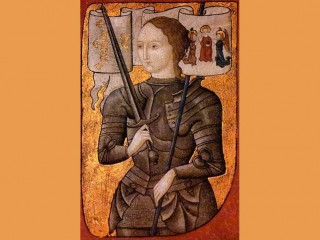
Joan Of Arc biography
Date of birth : -
Date of death : 1431-05-30
Birthplace : Domrémy, Bar, France
Nationality : French
Category : Historian personalities
Last modified : 2010-05-21
Credited as : National heroine, Catholic saint, Pope Benedict XV
Known as The Maid of Orleans, Joan of Arc would become a national icon for France, the Catholic Church, and even the world. Her courage and staunch claims that she complied with the will of God and of the Saints would make her viewed as a heretic in her day. However, this peasant girl would lead the French Army to defeat the British in what became one of the most famed battles of the day, the Battle of Orleans.
Joan was born a peasant, according to the definition of her day. Her father was a farmer and she grew up under what she believed was divine protection. She began hearing the voices of the church at a young age and claims that she spoke with St. Michael, St. Catherine, and others. Seen as either a heretic or a visionary, she would take her claims to King Charles, describing how she would help him regain his throne. She joined the French Army at age 17 and dressed as a man to better fit the part and rode with armed forces to Chinon.
In her visions, she saw battles taking place between the French and English. And, on different occasions, knew where the battles were taking place even though no one else had sent word. She led the forces to the war-stricken regions and aided the French armies to victory. She soon convinced Charles in Tours that he should quickly reclaim the crown, that it was his destiny. After ridding the land of the English along the main river vein, the forces brought down a castle that the English had been using as a stronghold in Beaugency.
In her latter years, Joan was seen as a heretic to the church for claiming that she had received divine revelation from Jesus and Mother Mary. She claimed she listened to God and the church was not to be trusted because of its errors against man. During several weeks, she was forced to discuss her role in the crowning of Charles and how she had known so much about what was going on in the war. The church, never able to get a full testimony out of her, released her to secularists who decided that she should be put to death, burned at the stake as a heretic against the church. Nearly five centuries later, Pope Benedict XV investigated the matter fully and declared her a Saint in May of 1920.
















